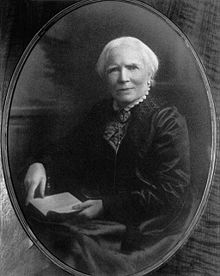Elizabeth Blackwell (medical doctor)
Elizabeth Blackwell (born February 3, 1821 in Counterslip near Bristol , England , † May 31, 1910 in Kilmun , Scotland ) was one of the first women doctors with a university degree. In addition to her commitment to women's studies , she did pioneering work in preventive medicine and health policy . Like her brother Henry Blackwell and his wife Lucy Stone , she also campaigned for the abolition of slavery .
Life
The Blackwell family moved to the United States in 1832, where the father died in 1838. To support the family, Elizabeth's mother ran a private school with her three daughters. Elizabeth wanted Medicine study, however, was - rejected by twelve colleges - as a woman. It was not until the mid-1840s that she found a place at Geneva College in New York , where she graduated on January 23, 1849 as the first American female doctor and the best of her class.
It was difficult for Blackwell to practice as a doctor because, on the one hand, no one wanted to rent her practice rooms, on the other hand, the patients were skeptical of a woman. Hospitals refused to hire her, and when she went to Paris , not even her doctorate was recognized. Nonetheless, between 1849 and 1851, she succeeded in further training in the field of obstetrics in both Paris and London. She finally opened her own practice in New York. To do this, she first had to buy her own house, as no homeowner rented it to the doctor. In 1854 she published a collection of texts on hygiene under the title The Laws of Life, with Special Reference to the Physical Education of Girls .
It was only after a few years that financial success was achieved thanks to satisfied patients and the attention of the press. Together with her sister Emily and Marie Zakrzewska , she built a “university hospital” in 1857 , where the three doctors wanted to give young women the opportunity to train as doctors without having to undergo the harassment and rigors of studying at a “men's university” to have to - the Women's Medical College of the New York Infirmary was born. In order to prevent damage to the reputation of the doctors she trained, Blackwell insisted on very strict admission exams and final exams. The training was rigorous and the prospective doctors had to demonstrate impeccable morals, otherwise they were excluded from the course.
In 1869 Elizabeth Blackwell left her hospital to her successors and returned to the United Kingdom, where she founded the National Health Society in 1871 - the forerunner of today's British National Health Service (NHS). Together with Florence Nightingale , she trained nurses and doctors at the London School of Medicine for Women . From 1875, Blackwell withdrew more and more from the medical practice, but continued to write books. She died in Scotland in late May 1910.
Honors
It found its way into the visual arts of the 20th century. The feminist artist Judy Chicago dedicated one of the 39 place settings at the table to her in her work The Dinner Party .
Individual evidence
- ↑ NIH , History of Medicine: "That Girl There Is Doctor in Medicine" - Elizabeth Blackwell, America's First Woman MD (accessed January 22, 2019)
- ↑ a b Antonius Lux (ed.): Great women of world history. 1000 biographies in words and pictures . Sebastian Lux Verlag , Munich 1963, p. 67.
- ↑ Barbara A. Diehl: Blackwell, Elizabeth. In: Wolfgang U. Eckart and Christoph Gradmann (eds.): Ärztelexikon. From antiquity to the present. , 3. Edition. Springer, Heidelberg 2006, p. 50, DOI: 10.1007 / 978-3-540-29585-3 .
- ↑ Elizabeth A. Sackler Center for Feminist Art: The Dinner Party. Place Setting: Elizabeth Blackwell. Brooklyn Museum, April 13, 2007, accessed April 24, 2014 .
literature
- Elizabeth Blackwell, Amy Sue Bix, Pioneer Work in Opening the Medical Profession to Women: Autobiographical Sketches. Humanity Books, 2005. ISBN 1-59102-255-X
- Adele Glimm, Elizabeth Blackwell: First Woman Doctor to Modern Times. McGraw-Hill Education, 2000. ISBN 0-07-134335-0
Web links
- Literature by and about Elizabeth Blackwell in the catalog of the German National Library
- Elizabeth Blackwell (medical doctor). In: FemBio. Women's biography research (with references and citations).
- Online version of an exhibition from the National Library of Medicine, Bethseda (Md.), 1999 (Eng.)
- Short biography of about.com (Engl.)
| personal data | |
|---|---|
| SURNAME | Blackwell, Elizabeth |
| BRIEF DESCRIPTION | English doctor |
| DATE OF BIRTH | February 3, 1821 |
| PLACE OF BIRTH | Counterslip , England |
| DATE OF DEATH | May 31, 1910 |
| Place of death | Kilmun , Scotland |


